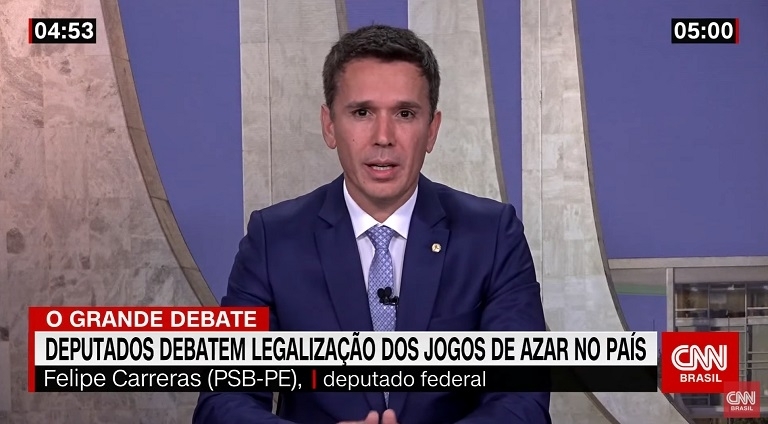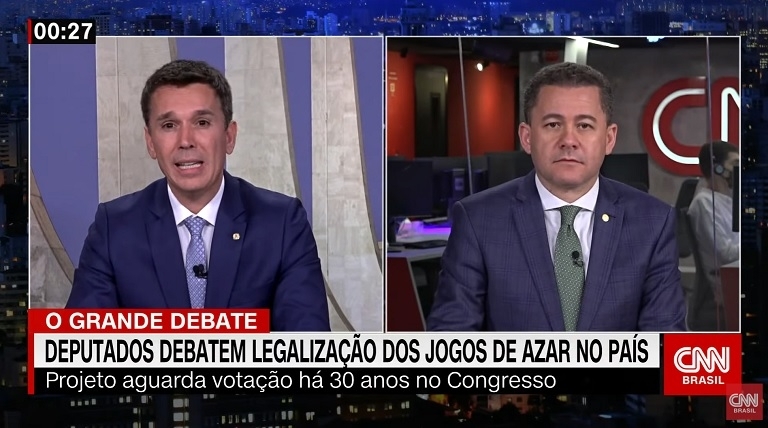

Aired from April to December 2020 as a special section in CNN Brasil, “O Grande Debate” this year becomes an independent show every Tuesday at 10:30 pm. Lasting 45 minutes, each week it features two guests, with different views on current and relevant topics. Mediation is in charge of journalist and presenter Carol Nogueira.
The final version of the report that creates the Regulatory Framework (Bill 442/91) for the gaming and betting sector in Brazil is a comprehensive, modern document that follows the best practices of regulated world markets. Through 162 articles, the final text will be submitted to the Working Group on the Regulatory Framework for Gaming for analysis, adjustments and approval. It will then be handed over to the President of the Chamber, Arthur Lira (PP-PI).
For Carerras, “the text presents a catalog of legal concepts about the new legal regime and its different modalities, with gambling and betting being considered as a typically private economic activity subject to State control. We are proposing that the exploration of casino games, bingo, jogo do bicho, gaming machines, fixed-rate betting, horse racing betting and skill games be allowed in Brazil.”

The text defines that the gaming and betting market will be regulated and supervised by the Union through a regulatory body and we are also proposing the creation of the National System of Gaming and Betting with representatives of the state regulatory body, operators, employees, auditing companies and entities of self-regulation.
During the debate, Deputy Carreras explained that since this is an economic activity subject to State control, access will not be free, but conditioned on obtaining acts of consent such as authorization for the constitution of gaming operating entities, licenses, authorization for the exercise of administrative and registration roles of agents, physical and virtual establishments and gambling and betting machines. “In addition to the general rules, specific conditions for licensing the modalities of these projects are established. In an innovative way, the text brings, for the first time in Brazil, specific rules about the so-called games of skill.”
“For more sensitive issues of this activity such as pathology, money laundering and control, specific chapters were dedicated to protecting players and gamblers. In addition to preventing money laundering and terrorist financing, supervision and inspection,” added the rapporteur of the substitute to Bill 442/91.
In the text, the creation of the National Policy for the Protection of Players and Bettors is being proposed through the establishment of public policy guidelines for this group of people. A chapter was also introduced with a minimum set of 'Honest and Trustworthy Gaming Guarantees' in line with international good practice with basic rights for players and gamblers, as well as clear rules for advertising for the activity.
An important measure on the practice of responsible gaming is the creation of the National Register of Players and Bettors (Renajogo), a large database aimed at registering players and bets. “No player can participate in gaming in Brazil without registering in advance. In this database, bets and prizes will also be registered. Other important measures are the prediction of rules for the prevention and limitation of losses and, also, for the prevention of players' indebtedness. The granting of credits to players will not be allowed,” says Carerras.

The chapter on loss prevention and limitation establishes that gaming and betting operators and tourism entities must have internal control mechanisms and systems that allow the player and bettor to establish or define: daily limit on game or betting time, maximum loss limit, pause period and self-exclusion.
“With regard to money laundering, the substitute presents important rules such as the obligation to implement and maintain money laundering prevention policies and procedures. Among other innovations, it is worth mentioning the rule that any payment or receipt of amounts related to a game or bet that has an operator or tourism entity as a counterparty is made exclusively through transfers to and from current, savings or payment maintained in a financial institution or payment institution authorized to operate by the Central Bank of Brazil,” commented Deputy Felipe Carerras.
Another novelty in the proposal to curb money laundering is the collection, verification, validation and updating of registration information so that players and bettors, as well as their employees, partners and outsourced service providers, can get to know each other. All gaming and betting operations must be registered with the identification, monitoring and analysis of bets to identify suspicious behavior and situations. All transactions (receipt and payment) of amounts above R$ 10 thousand will be mandatorily communicated to the Financial Activities Control Board (Coaf).
Source: GMB